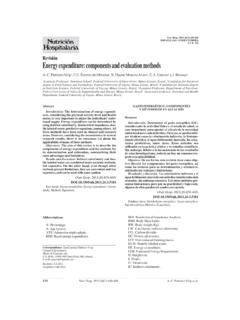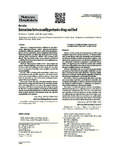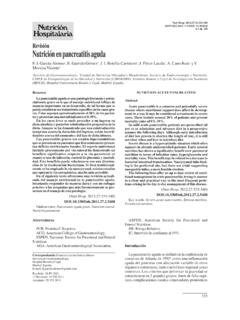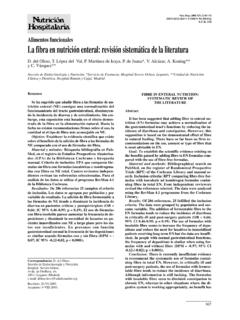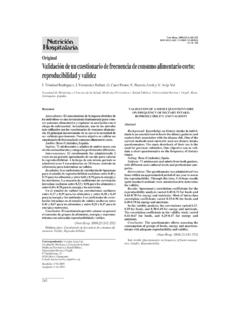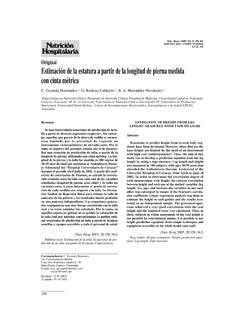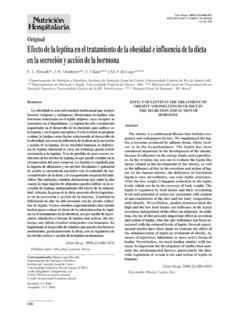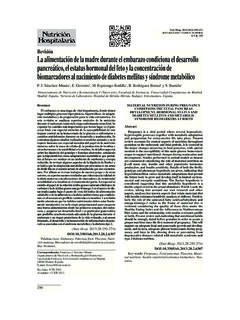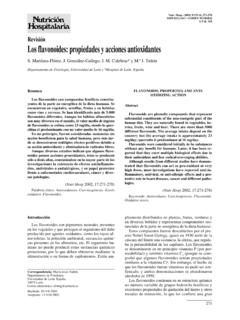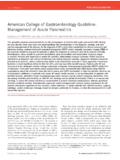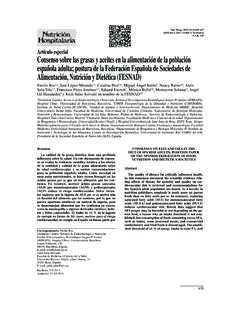Transcription of Group dialectical behavior therapy adapted for obese ...
1 1141 Nutr Hosp. 2012;27(4):1141-1147 ISSN 0212-1611 CODEN 318 OriginalGroup dialectical behavior therapy adapted for obese emotional eaters; a pilot studyM. A. Roosen1, D. Safer2, S. Adler2, A. Cebolla3and T. van Strien4,51 Outpatient clinic for eating disorders and obesity at the Mental Health Care Centre region Oost Brabant. The University School of Medicine. Department of Psychiatry & Behavioral Sciences. Stanford. California. Jaume I. Spain. 4 Behavioural Science Institute. Radboud University Nijmegen. The Netherlands. 5 Institute forGender Studies. Radboud University Nijmegen. The DIALECTICO-COMPARTIMENTALGRUPAL ADAPTADA PARA EL TRATAMIENTO COMEDORES EMOCIONALES OBESOS; UN ESTUDIO PILOTOR esumenLa Terapia Dial ctico-Conductual (TDC) es una tera-pia eficaz para el tratamiento del trastorno por atrac n(TA).
2 Este estudio piloto pretende estudiar la eficacia dela TDC grupal para la reducci n de psicopatolog a ali-mentaria y el logro el mantenimiento del peso, para obe-sos comedores emocionales . Treinta y cinco obesos comedores emocionales de ambos sexos fueron evalua-dos al final del tratamiento y en seguimiento a los seismeses en psicopatolog a alimentaria y reducci n de pesotras recibir 20 sesiones de TDC en grupo adaptado para eltratamiento del comer emocional. La TDC dio lugar areducciones significativas en comer emocional y otrosmarcadores de la psicopatolog a alimentaria al terminarel tratamiento, que se mantuvieron durante el segui-miento. La tasa de abandonos fue muy baja, s lo una par-ticipante abandon el tratamiento. Treinta y tres (94%)participantes de la muestra proporcionaron datos entodos los puntos de la evaluaci n.
3 De stos, el 80% obtuvouna reducci n de peso o el mantenimiento del mismo alfinalizar el tratamiento y durante todo el per odo deseguimiento. El tama o del efecto de la reducci n de pesofue peque o. Este estudio piloto demuestra que el uso dela TDC para el comer emocional en personas obesas esuna intervenci n altamente aceptable y eficaz para lareducci n de estilos de ingesta relacionados con psicopa-tolog a, tanto al final del tratamiento como en el segui-miento. La capacidad de la TDC para limitar la trayecto-ria ascendente de la ganancia de peso en pacientes obesoscon alto grado de comer emocional sugiere que la TCDtambi n puede ayudar a limitar el aumento o incluso pre-venir la aparici n de morbilidad relacionada con la obesi-dad en estos pacientes.(Nutr Hosp. 2012;27:1141-1147) clave: Terapia dial ctica-compartimental.
4 Comeremocional. Mantenimiento de peso. Psicopatolog behavior therapy (DBT) has been shown toeffectively target binge eating disorder (BED). This studypilots the effectiveness of Group DBT for obese emotionaleaters to reduce eating psychopathology and achieveweight maintenance. Thirty-five obese male and femaleemotional eaters receiving 20 Group psychotherapysessions of DBT adapted for emotional eating wereassessed at end-of-treatment and 6 month follow-up forreductions in eating psychopathology and weight mainte-nance. DBT resulted in significant reductions inemotional eating and other markers of eating psychopat-hology at the end-of-treatment that were maintained atfollow-up. The drop-out rate was very low, with only 1participant dropping from treatment. Thirty-three(94%) of the sample provided data at every assessmentpoint.
5 Of these, 80% achieved either weight reduction orweight maintenance after treatment and throughout thefollow-up period. The effect size for weight reduction wassmall. This pilot study demonstrates Group DBT targe-ting emotional eating in the obese to be a highly accep-table and effective intervention for reducing eatingrelated psychopathology at both at end-of-treatment andduring follow-up. The ability of DBT to limit the upwardtrajectory of weight gain in obese patients with highdegrees of emotional eating suggests that DBT may alsohelp limit the increase or even prevent onset of obesityrelated morbidity in these patients.(Nutr Hosp. 2012;27:1141-1147) words: dialectical behaviour therapy . Emotionaleating. Weight maintenance. : Tatjana van Science Institute. Radboud University 9104, 6500 HE Nijmegen.
6 The : : Group dialectical :01. Interacci n 04/06/12 12:05 P gina 1141 IntroductionObesity, an increasingly prevalent disorder, is asso-ciated with severe and often life-threatening of body weight can have asubstantial positive impact, such as reversing thedevelopment of , obesity is well-known as being difficult to treat; calorie restrictingdiets, even when combined with behavioural tech-niques and exercise, seldom result in lasting ,4,5A meta-analysis on the long-term effectivenessof calorie restricting diets showed that between onethird and two thirds of the dieters regain more weightthan was initially lost on their diets4. In view of thisdisheartening evidence, the World Health Organiza-tion (WHO6) and others suggest clinicians advise theirpatients to aim for weight constancy as a means ofpreventing further development of ,8It is therefore important to investigate how weightconstancy could be better achieved for people who failto maintain weight loss.
7 One factor may be that mostcurrent lifestyle or behavioral interventions, whichtend to highly emphasize control of food stimuliwithin the obesogenic environment, may not be aseffective for individuals whose overeating is predomi-nantly triggered by negative emotions (emotionaleating) rather than tempting food cues. Evidence isaccumulating that the pathology associated withexcessive external and emotional eating is ,10,11 Very high levels of emotional eatinghave been demonstrated in at least 40% of obesecommunity samples12and are associated with poorinteroceptive awareness, high alexithymia, depressionand problems with affect ,10,13,14 Researchalso suggests that individuals with high degrees ofemotional eating are especially poor at achievingweight loss maintenance , dialectical behavior therapy (DBT) wasdeveloped for borderline personality disorder,16,17andwas successfully modified to target binge eatingdisorder (BED).
8 18,19,20,21 According to this affect regula-tion model, binge eating is a behavioral attempt to influ-ence, change, or control painful emotional states22,23,24 Binge eating, particularly in obese individuals, ishighly associated with emotional ,26 This pilottreatment included obese individuals who showed highlevels of emotional eating but did not meet criteria forBED. The aim of the present study was to pilot a DBTintervention focusing on emotional eating rather thanbinge eating for obese individuals with high emotionaleating keeping with the WHO recommendations6, thisstudy aimed to achieve weight maintenance, defined asa weight change of < 3% of baseline body hypothesized that DBT would successfully reduceeating psychopathology and that over time improve-ment in eating psychopathology would be associatedwith weight is standard practice in the Netherlands, allparticipants were directly referred from their generalpractitioner to the eating disorders outpatient clinicof the Mental Health Care Centre region OostBrabant in the Netherlands.
9 Inclusion criteria were abody mass index (BMI) > = 30 and < 40 kg/m2, age >=18 and < = 65 years, and a score > = on theemotional eating subscale of The Dutch EatingBehaviour Questionnaire (DEBQ),28indicating highlevels of emotional eating. Exclusion criteria weremeeting full clinical criteria based on the Diagnosticand Statistical Manual of Mental Disorders (DSM-IV) (APA29 ) for binge eating disorder (BED). Sixty-seven applicants were screened. Of these, 32 (47%)were excluded for BED. The final pilot groupconsisted of 35 patients. The Medical Ethical Committee (METiGG, KamerZuid) approved the design of the study, and all partici-pants signed informed completed questionnaires and had theirbody weights measured at the Centre at pre-treatment,post treatment and at the 6 month follow-up. Completedata are available at all 3 time points for all but 2 of the35 participants (n = 33; 94%).
10 InterventionA therapist manual for treating binge eating withDialectical Behaviour therapy (DBT) was obtainedfrom Stanford University (USA) and was translatedinto Dutch. The published treatment manual inEnglish is now available20. The principal adaptationfrom the BED version was the substitution of emotional eating as a treatment target instead ofbinge eating. The highly structured treatmentincluded an initial brief pre-treatment interviewfollowed by 20 weekly Group sessions of 2 hourgroup therapy . Groups were led by two trained co-therapists and included a maximum of 9 patients pre-treatment interview oriented participants tothe goals of treatment, which involved reducing eatingpathology by teaching emotion regulation this session, emphasis was placed on the impor-tance of maintaining body weight (versus a focus onweight reduction).
